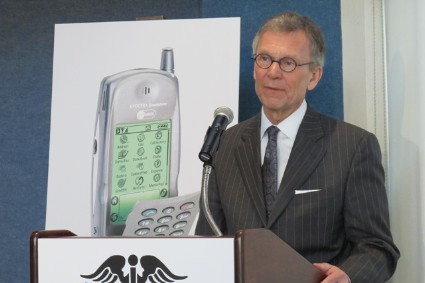User login
WASHINGTON – Medicare should cover telemedicine services regardless of geography, and physicians who use the technologies should be paid appropriately by all health insurers.
Those are among the goals of the Alliance for Connected Care, led by three formers leaders of the U.S. Senate.
At a press briefing, former Senate Majority Leader Tom Daschle (D-S.D.), former Senate Majority Leader Trent Lott (R-Miss.), and former Sen. John Breaux (R-La.) said that they have begun meeting with legislators regarding the coalition’s agenda.
Geographic expansion of telemedicine under Medicare is a key goal; the program currently will pay in rural areas only. Appropriate and widespread reimbursement for providers, including physicians, is another goal. The alliance also want to see telemedicine, remote patient monitoring and other technology that helps deliver and coordinate care, reimbursed under new models of care like patient-centered medical homes and accountable care organizations.
Sen. Lott said that he and Sen. Breaux recently met with Sen. Ron Wyden (D-Ore.), who likely will be the next chairman of the Finance Committee (since Chairman Max Baucus [D-Mont.] left Congress to become U.S. ambassador to China), as well as with committee member John Thune (R-S.D.).
"Both of them are very interested and committed," to helping increase access to telemedicine, Sen. Lott said at a briefing with reporters on Feb. 12.
Rep. Gregg Harper (R-Miss.) noted that his bill to encourage telemedicine is likely to see some action in the House this spring.
The Telehealth Enhancement Act of 2013 was introduced in October and currently has 14 cosponsors. With Congress looking at alternative delivery and payment models, "the time is right, the time is really now to grant providers flexibility to improve telemedicine," he said.
Telemedicine holds the potential to improve patient outcomes, quality of care, and to "meet the demands of the aging population," said Rep. Harper, who sits on the House Energy and Commerce Committee. It can also save Medicare and Medicaid money.
The Alliance for Connected Careis a nonprofit organization that includes a half-dozen large and small health-related companies on its board of directors: Verizon, Walgreens, CVS/Caremark, WellPoint, HealthSpot, and Teladoc. Associate members include Welch Allyn, Cardinal Health, Care Innovations, Doctor on Demand, and MDLive.
Those companies are mostly interested in selling telemedicine platforms to physicians or insurers. For 3 years, WellPoint has been offering its subscribers access to online consultations through LiveHealth Online. So far, it has saved money; patients have given it high marks, said John F. Jesser, vice president of provider engagement strategy at LiveHealth Online.
The alliance also plans to talk to state and federal officials about creating standard definitions for telemedicine, creating security and fraud protections, and making it easier for physicians to use telemedicine across state lines. According to the group, 20 states and the District of Columbia currently require commercial insurers to cover telemedicine services. Forty-five states allow Medicaid to pay for telemedicine.
Medicare is the laggard, Sen. Daschle said.
"We must ensure that our regulatory environment appropriately balances the exciting advances in technology for patients, while still maintaining safeguards that allow innovation," he said.
Several physician organizations and patient advocacy groups have signed on as advisers to the alliance, including the American Academy of Family Physicians, the National Association of ACOs, the American Heart Association, and National Alliance on Mental Illness.
On Twitter @aliciaault
WASHINGTON – Medicare should cover telemedicine services regardless of geography, and physicians who use the technologies should be paid appropriately by all health insurers.
Those are among the goals of the Alliance for Connected Care, led by three formers leaders of the U.S. Senate.
At a press briefing, former Senate Majority Leader Tom Daschle (D-S.D.), former Senate Majority Leader Trent Lott (R-Miss.), and former Sen. John Breaux (R-La.) said that they have begun meeting with legislators regarding the coalition’s agenda.
Geographic expansion of telemedicine under Medicare is a key goal; the program currently will pay in rural areas only. Appropriate and widespread reimbursement for providers, including physicians, is another goal. The alliance also want to see telemedicine, remote patient monitoring and other technology that helps deliver and coordinate care, reimbursed under new models of care like patient-centered medical homes and accountable care organizations.
Sen. Lott said that he and Sen. Breaux recently met with Sen. Ron Wyden (D-Ore.), who likely will be the next chairman of the Finance Committee (since Chairman Max Baucus [D-Mont.] left Congress to become U.S. ambassador to China), as well as with committee member John Thune (R-S.D.).
"Both of them are very interested and committed," to helping increase access to telemedicine, Sen. Lott said at a briefing with reporters on Feb. 12.
Rep. Gregg Harper (R-Miss.) noted that his bill to encourage telemedicine is likely to see some action in the House this spring.
The Telehealth Enhancement Act of 2013 was introduced in October and currently has 14 cosponsors. With Congress looking at alternative delivery and payment models, "the time is right, the time is really now to grant providers flexibility to improve telemedicine," he said.
Telemedicine holds the potential to improve patient outcomes, quality of care, and to "meet the demands of the aging population," said Rep. Harper, who sits on the House Energy and Commerce Committee. It can also save Medicare and Medicaid money.
The Alliance for Connected Careis a nonprofit organization that includes a half-dozen large and small health-related companies on its board of directors: Verizon, Walgreens, CVS/Caremark, WellPoint, HealthSpot, and Teladoc. Associate members include Welch Allyn, Cardinal Health, Care Innovations, Doctor on Demand, and MDLive.
Those companies are mostly interested in selling telemedicine platforms to physicians or insurers. For 3 years, WellPoint has been offering its subscribers access to online consultations through LiveHealth Online. So far, it has saved money; patients have given it high marks, said John F. Jesser, vice president of provider engagement strategy at LiveHealth Online.
The alliance also plans to talk to state and federal officials about creating standard definitions for telemedicine, creating security and fraud protections, and making it easier for physicians to use telemedicine across state lines. According to the group, 20 states and the District of Columbia currently require commercial insurers to cover telemedicine services. Forty-five states allow Medicaid to pay for telemedicine.
Medicare is the laggard, Sen. Daschle said.
"We must ensure that our regulatory environment appropriately balances the exciting advances in technology for patients, while still maintaining safeguards that allow innovation," he said.
Several physician organizations and patient advocacy groups have signed on as advisers to the alliance, including the American Academy of Family Physicians, the National Association of ACOs, the American Heart Association, and National Alliance on Mental Illness.
On Twitter @aliciaault
WASHINGTON – Medicare should cover telemedicine services regardless of geography, and physicians who use the technologies should be paid appropriately by all health insurers.
Those are among the goals of the Alliance for Connected Care, led by three formers leaders of the U.S. Senate.
At a press briefing, former Senate Majority Leader Tom Daschle (D-S.D.), former Senate Majority Leader Trent Lott (R-Miss.), and former Sen. John Breaux (R-La.) said that they have begun meeting with legislators regarding the coalition’s agenda.
Geographic expansion of telemedicine under Medicare is a key goal; the program currently will pay in rural areas only. Appropriate and widespread reimbursement for providers, including physicians, is another goal. The alliance also want to see telemedicine, remote patient monitoring and other technology that helps deliver and coordinate care, reimbursed under new models of care like patient-centered medical homes and accountable care organizations.
Sen. Lott said that he and Sen. Breaux recently met with Sen. Ron Wyden (D-Ore.), who likely will be the next chairman of the Finance Committee (since Chairman Max Baucus [D-Mont.] left Congress to become U.S. ambassador to China), as well as with committee member John Thune (R-S.D.).
"Both of them are very interested and committed," to helping increase access to telemedicine, Sen. Lott said at a briefing with reporters on Feb. 12.
Rep. Gregg Harper (R-Miss.) noted that his bill to encourage telemedicine is likely to see some action in the House this spring.
The Telehealth Enhancement Act of 2013 was introduced in October and currently has 14 cosponsors. With Congress looking at alternative delivery and payment models, "the time is right, the time is really now to grant providers flexibility to improve telemedicine," he said.
Telemedicine holds the potential to improve patient outcomes, quality of care, and to "meet the demands of the aging population," said Rep. Harper, who sits on the House Energy and Commerce Committee. It can also save Medicare and Medicaid money.
The Alliance for Connected Careis a nonprofit organization that includes a half-dozen large and small health-related companies on its board of directors: Verizon, Walgreens, CVS/Caremark, WellPoint, HealthSpot, and Teladoc. Associate members include Welch Allyn, Cardinal Health, Care Innovations, Doctor on Demand, and MDLive.
Those companies are mostly interested in selling telemedicine platforms to physicians or insurers. For 3 years, WellPoint has been offering its subscribers access to online consultations through LiveHealth Online. So far, it has saved money; patients have given it high marks, said John F. Jesser, vice president of provider engagement strategy at LiveHealth Online.
The alliance also plans to talk to state and federal officials about creating standard definitions for telemedicine, creating security and fraud protections, and making it easier for physicians to use telemedicine across state lines. According to the group, 20 states and the District of Columbia currently require commercial insurers to cover telemedicine services. Forty-five states allow Medicaid to pay for telemedicine.
Medicare is the laggard, Sen. Daschle said.
"We must ensure that our regulatory environment appropriately balances the exciting advances in technology for patients, while still maintaining safeguards that allow innovation," he said.
Several physician organizations and patient advocacy groups have signed on as advisers to the alliance, including the American Academy of Family Physicians, the National Association of ACOs, the American Heart Association, and National Alliance on Mental Illness.
On Twitter @aliciaault

